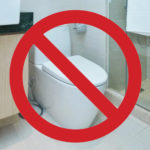SANITARY PRODUCTS & THE ENVIRONMENT
Many women underestimate the huge impact that disposed sanitary products have on the environment.
According to the Women’s Environmental Network, every female will use an average of 11,000 disposable menstrual products during her life, and the outcome is inevitably a huge amount of waste that goes directly into the environment – which is why it’s essential that we find eco-friendly ways to dispose of sanitary products.
How can periods affect the environment?
Most women have essential products that prepare them for that time of the month – but many don’t consider the negative effects that the plastic contained in the majority of sanitary products have on the environment.
A woman’s ‘menstrual carbon footprint’ indicates the amount of carbon dioxide discharged into the atmosphere as a result of period-related sanitary products.
A study by Friends of the Earth showed that, as well as their contribution to plastic pollution, a year’s worth of a typical menstrual products, per woman, has a carbon footprint of 5.3kg of carbon dioxide. This is caused by small amounts of dioxin (a by-product created from synthetic carbon fibre rayon) found in many cotton tampons. In addition, growing cotton using pesticides and a lot of water, and the cotton harvesting process introduces some of these chemicals into the female sanitary products.
The research also revealed that 6% of the average tampon is made of plastic and up to 90% of the average sanitary towel. Non-applicator tampons are a greener choice and organic cotton tampons are also a bit kinder to the environment (and your body).
But even if you choose non applicator organic cotton tampons, there is still the issue of waste. These products can’t be recycled and can end up in the environment. Those with a high plastic content, for example plastic tampon applicators, can take over 500 years to degrade.
Sanitary towels damage the environment just like cotton buds, single use straws and drinks stirrers. The latter three will be banned in 2020 in the UK in a bid to clear our oceans. However, sanitary products don’t seem to generate the same concerns from the public.
The Marine Conservation Society reported that there are approximately 4.8 pieces of menstrual waste found for every 100m of beach cleaned. This includes pads, panty-liners, backing strips, applicators and tampons.
What solutions can we bring to this?
It would be a great start if we all became ‘binners’. It might sound obvious, but tampons and pads shouldn’t be flashed down the toilet. In addition to generating waste, flushing tampons can cause blockages in the sewer system. They can also contribute to ‘fatbergs’. These are huge masses formed by fat, oil, and single use products such as sanitary items and face wipes – and they can create blockages that are very difficult to clear. In Sidmouth, Devon, for example, one was recently discovered that amounted to the length of six double decker buses.
So, being a ‘binner’ rather than a ‘flusher’ can be a huge step towards improving our environmental.
A study conducted by The Institution of Environmental Sciences found that around 2.5 million tampons, 1.4 million sanitary liners, and 700,000 panty liners are flushed down UK toilets every day.
As well as being a ‘binner’ choose organic tampons; these do not contain chemicals like chlorine or bleach. Additionally, organic tampons are made of pesticides-free cotton, which also reduces their ecological impact. And, of course, avoid applicator tampons if you can. For example, the Lil-Lets range of non-applicator tampons is entirely plastic free with an absorbent core that contains viscose.
It would be helpful if sanitary brands openly revealed the environmental impact of their products and clearly indicated the most eco-friendly options.

To educate and inform more women, various groups such as The Women’s Environmental Network are promoting a #PeriodsWithoutPlastic movement. This will hopefully help tackle the issue and reduce the negative environmental impact. Action is needed now more than ever. We must all commit to making the difference with small changes to our own cycle routine.
In conclusion; buy non-applicator, organic products and bin – don’t flush!
ABOUT THE AUTHOR
Megan Johnstone is from Lil-Lets. For more information see: lil-lets.com/uk
SOURCES:
https://www.wen.org.uk/environmenstrual-campaign
https://friendsoftheearth.uk/plastics/plastic-periods-menstrual-products-and-plastic-pollution
https://friendsoftheearth.uk/plastics/plastic-periods-menstrual-products-and-plastic-pollution
https://news.sky.com/story/plastic-straws-stirrers-and-cotton-buds-to-be-banned-in-england-11725704
https://www.shethinx.com/blogs/womens-health/life-cycle-of-tampon-biodegradable-period-products

